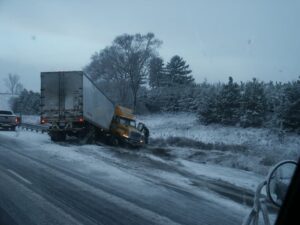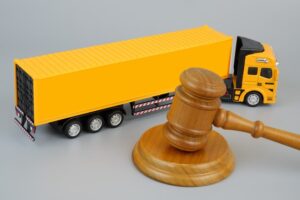In the world of truck accidents, two common types that may cause serious injuries and damage are jackknife and rollover accidents. Both of these accidents can be terrifying experiences for everyone involved, causing intense emotional distress and physical harm. A jackknife accident occurs when a truck’s trailer swings out to the side, resembling the folding of a pocket knife. This can lead to the truck colliding with other vehicles or blocking multiple lanes of traffic, causing extensive damage and potential injuries.
On the other hand, a rollover accident happens when a truck tips over onto its side or roof. This can be caused by factors such as high speeds, sharp turns, or hazardous road conditions. Rollover accidents are particularly dangerous, as they can cause significant harm to the driver, passengers, and other vehicles on the road.
If you or a loved one has been involved in a jackknife or rollover truck accident, you need to understand your legal rights and seek the help of a skilled Winchester, VA truck accident attorney. Contact an attorney near you to ensure that your rights are protected and that you receive the compensation you deserve for your injuries and losses.
What Are Jackknife Truck Accidents?

Jackknife accidents are a common type of truck accident that poses significant dangers to everyone on the road. They occur when a truck’s trailer swings out at an angle, forming an “L” or “V” shape with the cab. This happens when the trailer loses traction with the road surface, causing it to slide out of control.
The main cause of jackknife accidents is the truck driver’s sudden braking or improper use of brakes. When a driver brakes too hard or suddenly, it can cause the trailer to lose traction with the road, leading to a jackknife accident. Poor road conditions, such as wet or icy surfaces, can also contribute to the occurrence of a jackknife accident. Additionally, driver error and negligence, including speeding or sharp turns, can increase the risk of a jackknife accident. Mechanical failures, like malfunctioning brakes, can also be a factor in causing these accidents.
Jackknife accidents make the truck uncontrollable and dangerous. When a truck jackknifes, it can collide with other vehicles on the road, leading to significant damage and injuries. The swinging trailer can block multiple lanes of traffic, causing pile-ups and putting other drivers at risk.
Injuries sustained in jackknife accidents can be severe for both the truck driver and the occupants of other vehicles involved. Head injuries, broken bones, and spinal cord injuries (SCI) are common in these accidents. The impact force generated during a jackknife accident can lead to catastrophic injuries and even fatalities.
What Are Rollover Truck Accidents?

Rollover accidents are another type of truck accident that can have devastating consequences. They occur when a truck tips over onto its side or roof, often due to imbalance or sudden maneuvers. Rollover accidents can be classified as single-vehicle or multi-vehicle crashes.
Single-vehicle rollover accidents happen when a truck loses control and tips over without colliding with other vehicles. Factors contributing to single-vehicle rollovers include overloaded or improperly loaded cargo, causing an imbalance in the truck’s center of gravity. Sharp turns at high speeds also increase the risk of a rollover accident. Poor road conditions, tire blowouts, driver fatigue, or distraction can also be contributing factors.
Multi-vehicle rollover accidents occur when a truck tips over and collides with other vehicles. These accidents can be particularly dangerous due to the increased risk to surrounding vehicles. The debris from a rollover and the force of impact can cause significant damage and injuries to other drivers and passengers.
In both single-vehicle and multi-vehicle rollover accidents, the injuries sustained can be traumatic. Crushed limbs, internal bleeding, and fatalities are common outcomes of rollover accidents. The risk to surrounding vehicles is also high, as the impact force and scattered debris can cause additional accidents and injuries.
Differences Between Jackknife and Rollover Accidents
While jackknife and rollover accidents involve trucks and can have severe consequences, there are key differences between the two types. Understanding these differences is important in determining liability and pursuing compensation for injuries and losses.
Jackknife accidents involve the loss of control over the trailer, causing it to swing out at an angle, resembling the folding of a pocket knife. Rollover accidents, on the other hand, involve the entire truck tipping over onto its side or roof. The dynamics and risks associated with each type of accident are distinct.
Jackknife accidents can impact surrounding vehicles by blocking multiple lanes and leading to pile-ups. The swinging trailer poses a significant risk to other drivers, increasing the chances of collisions and injuries. Rollover accidents often cause widespread debris and multi-car collisions, endangering nearby vehicles.
Jackknife accidents are more frequent and severe than rollover accidents. Speed, road conditions, and driver error influence the severity of these accidents. Rollover accidents, while less frequent, are more likely to result in catastrophic injuries due to the truck tipping over and the potential for colliding with other vehicles.
Who Can Be Held Liable in These Accidents?

Determining liability in jackknife and rollover accidents can be complicated due to the involvement of multiple parties. The following parties may be held liable in these accidents:
- Truck Drivers: Negligent behaviors such as speeding, distracted driving, or fatigue can contribute to jackknife or rollover accidents. Truck drivers have a responsibility to drive safely and follow all traffic laws.
- Trucking Companies: Trucking companies can be held responsible for accidents if they fail to properly train drivers, enforce safety protocols, or maintain their vehicles. Negligence on the part of the company can contribute to accidents.
- Cargo Loaders: Improperly securing or overloading cargo can lead to imbalance and increase the risk of rollover accidents. Cargo loaders are responsible for ensuring that the cargo is properly loaded and secured.
- Vehicle Manufacturers: If mechanical failures, such as defective brakes or tires, contribute to a jackknife or rollover accident, the vehicle manufacturer may be held liable. Manufacturers have a responsibility to produce safe and reliable vehicles.
- Other Parties: Negligent drivers, road maintenance crews, or adverse weather conditions can also cause or exacerbate jackknife or rollover accidents. These parties may share liability in the event of an accident.
Common Injuries and Damages in Jackknife and Rollover Accidents
Both jackknife and rollover accidents can result in severe injuries and significant damages. The physical injuries that can occur in these accidents include head and brain injuries, spinal cord injuries, broken bones, burns, and internal trauma. These injuries often require extensive medical treatment and long-term rehabilitation.
In addition to physical injuries, truck accidents can also have an emotional and psychological impact on the victims. Post-Traumatic Stress Disorder (PTSD), anxiety, and emotional distress are common in the aftermath of a traumatic truck accident. The psychological effects can be long-lasting and may require therapy or counseling.
The economic damages associated with jackknife and rollover accidents can be substantial. Medical expenses, including hospital bills and rehabilitation costs, can quickly add up. Lost earnings due to time off work can also impact the victims’ financial stability. Furthermore, property damage to vehicles involved in the accident can result in additional costs.
Non-economic damages, such as pain and suffering, loss of quality of life, and loss of companionship for the families of victims, also need to be taken into account. Although these damages may not have an exact monetary value, they can significantly impact the lives of the victims and their loved ones.
Why These Accidents Are Legally Complex
Truck accidents, including jackknife and rollover accidents, are legally complex due to several factors. Understanding the complexities is imperative when pursuing legal action for injuries and damages.
One of these factors arises from multiple parties involved in the accident. Determining liability requires a thorough investigation to identify the responsible parties and their respective roles in the accident. Truck drivers, trucking companies, cargo loaders, and vehicle manufacturers may all share responsibility to some extent.
Federal regulations set forth by the Federal Motor Carrier Safety Administration (FMCSA) also impact liability and compliance issues in truck accidents. These regulations include guidelines on driver qualifications, hours of service, vehicle maintenance, and cargo safety. Compliance with these regulations is substantial in determining negligence and liability.
Collecting evidence in truck accident cases can present challenges. It is important to secure truck logs, black box data, cargo loading records, and maintenance reports to support the legal claims. Gathering this evidence requires legal experience and resources, as these records are often in the possession of the trucking company or other entities involved in the accident.
How a Truck Accident Lawyer Can Help

After being involved in a jackknife or rollover truck accident, seeking the assistance of a skilled truck accident lawyer is essential. A knowledgeable lawyer well-versed in truck accidents can provide valuable guidance and support throughout the legal process.
A truck accident attorney can help in the following ways:
- Determining Liability: Your attorney will thoroughly investigate, gather evidence, and identify the responsible parties. They have the skills to analyze the facts of the case and determine liability accurately, even if multiple parties are found to be at fault.
- Negotiating with Insurance Companies: Insurance companies often try to settle cases quickly and for the lowest possible amount. A truck accident lawyer can negotiate with the insurance company on behalf of the victim, ensuring they are not pressured into accepting an inadequate settlement offer.
- Maximizing Compensation: A skilled truck accident attorney will advocate for fair compensation, taking into account both economic and non-economic damages. They will work to ensure that all losses, including medical expenses, lost earnings, and pain and suffering, are properly accounted for.
- Litigation Experience: In some cases, litigation may be necessary to seek the full compensation deserved. A truck accident lawyer with trial experience will be prepared to present a strong case in court if negotiations are unsuccessful.
Steps to Take After a Jackknife or Rollover Accident
If you or a loved one has been involved in a jackknife or rollover truck accident, be sure to take the following steps to protect your rights and build a strong case:
Seek Medical Attention
Your health and well-being should be a priority. Seek medical attention immediately, even if you do not feel immediate pain or injuries. Documenting your injuries is essential both for your health and for legal purposes.
Avoid Speaking with Insurance Adjusters Without Legal Representation
Insurance adjusters may try to gather information from you that can be used to minimize your claim. It is best to consult with a truck accident lawyer before speaking with any insurance representatives.
Consult a Reputable Truck Accident Lawyer Promptly
Time is of the essence when it comes to truck accident cases. Reach out to a reputable truck accident attorney as soon as possible to discuss your case and explore your legal options. Early intervention by a lawyer can help protect your rights and ensure a strong case.
Were You Involved in a Jackknife or Rollover Truck Accident? A Seasoned Truck Accident Lawyer Can Help
Due to their size and weight, trucks can be extremely dangerous to share the road with. Jackknife and rollover truck accidents especially pose significant dangers to everyone involved. The consequences are often severe, resulting in injuries, damage, and emotional distress. In the aftermath of these accidents, medical bills, property damage, and lost income can quickly pile up, leaving you feeling helpless and unsure of where to turn. You have the legal right to hold negligent parties accountable and seek fair compensation.
If you or a loved one has been involved in a jackknife or rollover truck accident, seek the help of a seasoned truck accident attorney. They will guide you through the legal process, protect your rights, and help you pursue the compensation you deserve. Contact an attorney near you for a free consultation and to explore your legal options. Don’t face this difficult situation alone – let an experienced personal injury lawyer be your ally in seeking justice and obtaining the compensation you need to rebuild your life.
